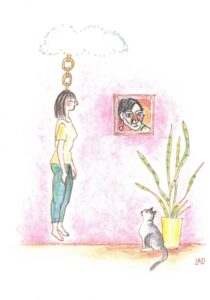“Stand up straight, like little lead soldiers!” Mater Maria says in her accented Spanish as we file into the playground. I am in first grade, and am quickly learning that, to the German nuns whose school I attend in Barcelona, good posture is practically a Christian virtue, on a par with punctuality. Almost a century later my yoga teacher urges, more gently but as insistently, “stand as if you are hanging from a golden chain that is coming out of the top of your head.”
For most of my life, however, the real posture enforcer was my mother. Starting when I reached puberty, getting me to straighten my spine became her mission. It wasn’t her only mission. There was also the mission to keep my hair out of my eyes “because a broad forehead is a sign of intelligence,” and the mission to keep me from frowning and pouting, “because a pleasant facial expression is so much more attractive.” But training me to stand up straight was her biggest challenge.
I wasn’t aware of how badly I slouched, but slouch I did, and it drove my mother crazy. Right in the middle of Mass, as I hunkered sleepily over my missal, she would elbow me in the ribs and demonstrate the proper way, which was to hold the missal up to mid-chest level while keeping the spine ramrod straight. “Posa’t dreta!” (Straighten up!) became her refrain.
Her focus on posture and other aspects of etiquette was especially intense during meals, and it did not lead to pleasant dining. One day, when I was about twelve, I had an idea for a deal that I hoped would give me some respite. I proposed to my mother that I would follow her instructions without complaining on six days of the week, but in exchange, on Wednesdays, she would leave me alone to eat in whatever way I wanted. She agreed, and when Wednesday came around and my soup was placed before me I leaned over and lapped it up like a dog, without using a spoon. It was extremely uncomfortable, took a long time, and I got some grease on the end of my nose, but I made my point.
The agreement did not last, however, not because I started using a spoon, but because my mother simply couldn’t stick to her side of it. “I know it’s Wednesday,” she would say, “but….” And so the endless litany continued, “Don’t talk with your mouth full. Don’t gulp your food. Don’t chew with your mouth open,” and always and especially, “Sit up straight! Don’t slouch! People will think you’re a hunchback.” This went on for the next decade or so, until I left home for graduate school.
Now that the years have done their work and my skeleton seems bent on sinking—neck into shoulders, ribs towards pelvis—my mother’s posture advice is rising again from my subconscious, where it lay dormant for decades. Not a moment too soon, I have become aware of my neck, my shoulders, my spine. They need all the support that my muscles and my will can give them. But that takes energy, and it feels so much easier just to give in and droop.
Every week, in yoga class, I am reminded not to do this, but to straighten, and lengthen, and be like a tree with branches reaching up towards the sky. Or stand like a mountain, chin tucked in, neck long, core engaged, always remembering that invisible golden chain emerging from my cranium and stretching me to undreamed of lengths. But none of this gets me to sit up and pay attention as promptly as the echo of my mother’s youthful voice, nagging me for the millionth time: “straighten up, or people will think you’re a hunchback!”



8 Responses
I can still hear my mother saying don’t chew with your mouth open ! I don’t remember ever saying that to my kids- is it a generational thing ?
I was just wondering the same thing. Were our kids just born knowing to chew with their mouths closed and to stand straight?
I LOVE that you licked your soup directly from the bowl!!!
It took some doing, but I was determined.
Until you left for GRAD SCHOOL? Wow.
Mine never gave up about my weight. Constant nagging. I wasn’t even heavy!
She couldn’t get rid of the weight from eight pregnancies, so she fought it all HER life, but being put on diet pills (Dexadrine) when you’re 11 isn’t good for you, and I don’t know how much it has affected the rest of my life.
Now, the irony is I have to eat 6-7 small meals daily to manage low blood sugar – and I hate the sight, smell, and taste of food – and many of them attack me.
Life is weird. I keep my mouth strictly closed about my kids’ weight, and I wish they were somewhat thinner, but it’s their business, and I love them, and they don’t need that in their heads.
This whole weight thing is a curse upon the Western world. And it shows no sign of going away.
Nice low-key touch to have an original Picasso self-portrait on the wall!
Ha! You noticed my tiny joke!